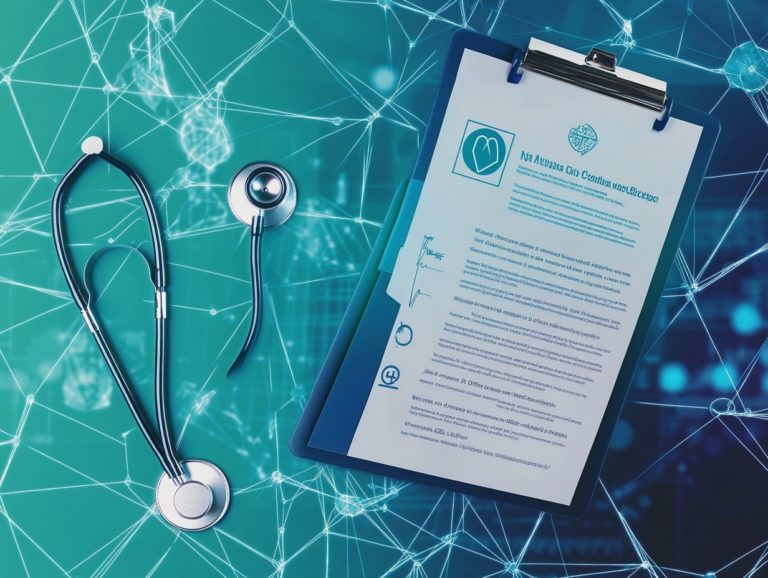5 Myths About Healthcare Certifications Debunked
In the ever-evolving world of healthcare, certifications have emerged as a focal point of discussion, but several misconceptions continue to linger.
You might believe that certifications are reserved solely for medical professionals, or perhaps you think that all certifications carry equal weight. These myths can obscure your understanding of the genuine advantages that certifications can offer.
This article sets out to debunk five prevalent myths surrounding healthcare certifications while delving into the benefits they provide. Whether you re contemplating a career shift or aiming for advancement, grasping these misconceptions will empower you to make informed decisions about your professional path.
Contents
- Key Takeaways:
- 1. Healthcare Certifications Are Only for Medical Professionals
- 2. Healthcare Certifications Are Not Worth the Time and Money
- 3. All Healthcare Certifications Are Created Equal
- 4. Healthcare Certifications Are Only for Those Pursuing a Traditional Career Path
- 5. Once You Obtain a Healthcare Certification, You Don t Need to Renew It
- What Are the Benefits of Obtaining a Healthcare Certification?
- What Are the Different Types of Healthcare Certifications Available?
- How Can Healthcare Certifications Help with Career Advancement?
- What Are the Requirements for Obtaining a Healthcare Certification?
- What Are the Common Misconceptions About Healthcare Certifications?
- How Can One Determine If a Healthcare Certification Is Right for Them?
- Frequently Asked Questions
- 1. Are all healthcare certifications the same?
- 2. Is it necessary to have a healthcare certification to work in the industry?
- 3. Are online healthcare certifications less valid than in-person ones?
- 4. Can healthcare certifications only be obtained through a college or university?
- 5. Do healthcare certifications expire?
- 6. Are healthcare certifications only for doctors and nurses?
Key Takeaways:

Healthcare certifications are not just for medical professionals. They can greatly enhance your career and are worth the investment of time and money.
Not all healthcare certifications are the same. It is important to research and choose the right one for your career goals.
1. Healthcare Certifications Are Only for Medical Professionals
Many people mistakenly think healthcare certifications are reserved solely for medical professionals. In reality, they encompass a diverse array of roles, including educators, daycare providers, and first responders. All of these professionals play crucial parts in keeping high standards and safety within their fields.
You can explore a variety of certifications that align with your profession. For instance, daycare providers can earn Child Development Associate (CDA) credentials, which demonstrate their commitment to fostering safe and nurturing environments for children.
As an educator, you might consider specialized training in areas like mental health first aid or CPR. This ensures you’re well-prepared to handle emergencies in the classroom. First responders also pursue certifications to enhance their emergency response skills, ultimately boosting community safety.
Maintaining quality across these professions is vital. It shows a dedication to continuous improvement and ensures that all practitioners uphold the highest standards of care and professionalism.
2. Healthcare Certifications Are Not Worth the Time and Money
The belief that healthcare certifications aren’t worth your time and money is a misconception that misses their crucial role in boosting your professional credibility. In fact, there are 5 reasons to pursue a healthcare informatics certification that highlight their importance in ensuring adherence to quality assurance standards.
Investing in these certifications provides substantial long-term benefits that far outweigh the initial costs. As a professional in the field, possessing recognized credentials can open the door to numerous career advancement opportunities, often leading to higher salaries and enhanced job security.
Certification programs highlight the necessity of staying updated with best practices, which directly translates to improved patient outcomes. For example, in nursing, certifications in specialized areas like critical care or pediatrics not only refine a nurse’s skills but also guarantee that patients receive the utmost level of care.
These credentials create a safer and more effective healthcare environment, cultivating a culture of excellence in both education and clinical practice.
3. All Healthcare Certifications Are Created Equal
It s a common misconception that all healthcare certifications hold the same value and recognition. In reality, they differ significantly based on the accrediting bodies involved and the rigorous evaluation processes they implement.
Different organizations establish contrasting standards for training programs, which directly impacts the effectiveness and respect these certifications garner within the industry.
For example, some accrediting bodies prioritize hands-on experience and ongoing education, ensuring that certified professionals stay current with the latest practices. Others might focus more on written exams or theoretical knowledge, which could create gaps in practical skills.
As a result, employers often prefer certifications from reputable organizations, viewing these as indicators of a higher level of competence and dedication to quality care within the healthcare workforce.
4. Healthcare Certifications Are Only for Those Pursuing a Traditional Career Path

The idea that healthcare certifications are only for those following a traditional career path is misleading. These credentials can help you adopt new methods and expand your skill set across various institutions.
Take community clinics, for example. Certified workers often implement groundbreaking practices like telehealth, which means providing healthcare services remotely using technology. This broadens patient access and improves the quality of healthcare delivery.
First responders utilize their specialized training to apply advanced techniques in emergencies, dramatically enhancing their ability to provide immediate care.
These certifications not only boost your competency; they create a habit of learning and growing. This leads to exciting improvements in community health initiatives and emergency response efforts.
By diversifying your expertise, you’ll be well-equipped to tackle the evolving challenges in healthcare.
5. Once You Obtain a Healthcare Certification, You Don t Need to Renew It
Many individuals might think that obtaining a healthcare certification is a one-time deal, but true commitment requires ongoing dedication. Continuous improvement is essential for maintaining high safety and quality standards.
Regular renewal and ongoing training are crucial due to updates in clinical practices that incorporate the latest research and technological advancements.
Changes in safety regulations are necessary to ensure you stay informed about protecting both your patients and yourself. As healthcare standards evolve to meet new challenges, such as emerging diseases and shifts in patient demographics, staying current is vital.
Numerous certifications require professionals to engage in ongoing education, helping you stay informed about best practices and innovations. This proactive approach enhances the overall level of care you provide and ensures you remain at the forefront of your profession.
What Are the Benefits of Obtaining a Healthcare Certification?
Obtaining a healthcare certification unlocks amazing opportunities for your career! It enhances your credibility, improves patient outcomes, and reassures others of your commitment to high-quality standards and safety protocols.
Beyond these advantages, a healthcare certification can be a powerful catalyst for career advancement. It opens the door to new job opportunities and promotions that reflect your expertise. For instance, a certified nurse may step into a leadership role, directly influencing patient care standards within their unit.
Recognition from regulatory bodies boosts trust among patients and families, underscoring the importance of certification in specialties like radiology or pharmacy, where ongoing education and adherence to protocols are crucial.
Ultimately, fostering a culture of continuous improvement and learning within healthcare organizations enhances team collaboration and elevates the standard of care. This is especially evident in teams that prioritize certifications in new methodologies or technologies, setting a benchmark for excellence in healthcare delivery.
What Are the Different Types of Healthcare Certifications Available?
You ll find a rich tapestry of healthcare certifications available, each carefully created for specific roles and overseen by various regulatory bodies that uphold industry quality standards.
Take medical professionals, for example. They often pursue credentials like the American Association of Medical Assistants (AAMA) certification, which requires a careful blend of education and practical experience, topped off with a passing exam.
Then there are educators in health settings, such as nursing instructors, who are typically expected to acquire specialized certifications that show their teaching skills. These credentials encompass both theoretical knowledge and hands-on training, ensuring they are well-equipped to guide future healthcare providers.
Emergency responders also follow rigorous training programs, such as those from the National Registry of Emergency Medical Technicians (NREMT). These programs combine practical skills assessments with coursework, ensuring they re thoroughly prepared for real-world scenarios.
Each of these pathways highlights a profound commitment to maintaining high standards within the healthcare sector.
How Can Healthcare Certifications Help with Career Advancement?

Healthcare certifications can be a game changer for your career, significantly boosting your professional development opportunities. They not only demonstrate your commitment to quality assurance and continuous improvement but also position you as a standout in your field.
These credentials serve as a powerful validation of your expertise, often acting as a springboard for promotions and leading to higher salaries. For instance, a registered nurse who earned a certification in oncology experienced a 15% salary increase and quickly ascended to a nurse manager role.
Healthcare organizations value certified professionals for advanced positions, highlighting the competitive advantage these qualifications provide. Success stories are plentiful in this industry, with numerous individuals crediting their career advancements to the enhanced qualifications that come with certifications.
So, if you’re aiming for that next step, investing in these credentials could be the key to unlocking your success!
What Are the Requirements for Obtaining a Healthcare Certification?
Obtaining a healthcare certification requires you to meet specific requirements established by accrediting bodies. This typically involves completing prescribed training programs and passing technical assessments to demonstrate your proficiency.
Beyond these core elements, you may encounter variations in prerequisites, such as the necessity for a certain amount of hands-on work with patients or ongoing education credits. These requirements can vary significantly based on your chosen specialty or focus area within the healthcare field.
The significance of rigorous evaluations in this process cannot be overstated; they serve as essential benchmarks that ensure you are thoroughly prepared for the complexities of the real-world challenges you will encounter in your role. This structured assessment ultimately elevates the standard of care within the healthcare system, benefiting both professionals and patients alike.
What Are the Common Misconceptions About Healthcare Certifications?
There are numerous misconceptions surrounding healthcare certifications, including beliefs about their necessity and the nature of training programs. For instance, many people hold false ideas that can be clarified by exploring the top 10 myths about educational certifications and their impact on quality standards in professional practice.
You might find that many professionals dismiss certifications as mere formalities, not fully appreciating their vital role in enhancing skill sets and ensuring patient safety.
Research shows that healthcare facilities with certified staff report 20% fewer medical errors, underscoring the crucial need for proper training and adherence to industry standards. Experts stress that certifications do more than just provide a competitive edge; they also uplift overall service quality, leading to better patient outcomes.
Now is the time to understand these common misconceptions about educational certifications and underscore the critical importance of pursuing and maintaining healthcare certifications.
How Can One Determine If a Healthcare Certification Is Right for Them?
Determining whether a healthcare certification aligns with your goals requires thoughtful decision-making that meshes with your aspirations and the quality standards set by relevant accrediting bodies.
To navigate this complex situation, reflect on your career trajectory. Consider your current qualifications alongside your future ambitions.
Personal interests play a crucial role in ensuring long-term satisfaction and engagement in your chosen field. Assess how a specific certification might impact patient outcomes and fit with best practices and new developments in the healthcare sector.
By weighing these considerations, you can make informed choices that enhance your professional development and contribute positively to the overall patient care experience.
Frequently Asked Questions

1. Are all healthcare certifications the same?
No, various types of healthcare certifications exist, each with different requirements and focuses. Some may require a specific education level, while others may necessitate particular experience or skills.
2. Is it necessary to have a healthcare certification to work in the industry?
While it may not be necessary for all positions, having a healthcare certification can demonstrate your knowledge and skills in a specific area, making you a more competitive candidate.
3. Are online healthcare certifications less valid than in-person ones?
Not necessarily. Online certifications can still be accredited and recognized by employers, provided they meet certain standards. Research the credibility of the organization offering the certification.
4. Can healthcare certifications only be obtained through a college or university?
No, many organizations and institutions offer healthcare certifications, including professional associations, trade schools, and online platforms. Make sure to research the requirements and credibility of the organization before enrolling in a certification program.
5. Do healthcare certifications expire?
Some certifications may have an expiration date, while others require ongoing education or recertification. Be sure to check the specific requirements for your certification and stay up-to-date with any changes.
6. Are healthcare certifications only for doctors and nurses?
No, a variety of healthcare certifications are available for different roles and specialties, including medical assistants, lab technicians, and healthcare administrators. Research the specific requirements and options for your desired career path.
Start your journey today by exploring certification options!






